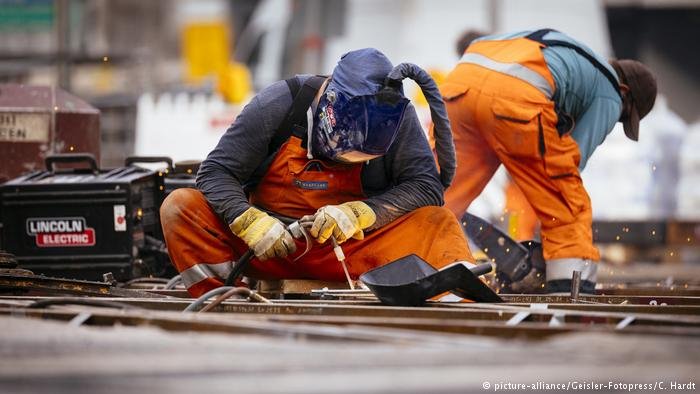Without migrants and refugees, important areas of the labor market in Germany would come to a standstill, a new study shows. Occupations where staff is already in short supply would be particularly affected.
Migrants and refugees are playing an increasingly important role for the German labor market. That's the result of a study published in late November.
One of the key findings: Not only do more and more migrants and refugees in Germany start an apprenticeship, they also play an increasingly important role in so-called shortage professions ('Engpassberufe') -- professions where there are more vacancies than applicants. While 19.2% of migrants and 14.9% of refugees worked in shortage professions in 2013, these figures had risen to 49.4% and 42.2% by 2019, respectively.
"In those occupations particularly relevant to society and where workers are especially scarce, we would be in a fix without international skilled workers," said Sarah Pierenkemper, one of the authors of the study.
Among those going through vocational job training, the number of refugees and migrants in shortage industries were even higher: More than 66% of refugees who were new trainees chose a shortage profession and 62.4% of migrants, compared to only 57.9% of Germans.
9 million adult migrants in Germany
The study was commissioned by the Friedrich Ebert Foundation -- a German political foundation associated with the center-left Social Democratic Party of Germany (SPD). It was conducted by the Competence Center for Securing Skilled Personnel (KOFA) at the Cologne Institute for Economic Research. It only looked at specialized occupations that usually require a two- to three-year vocational training, thus excluding jobs that require less qualifications or university training.
The study looked at the roughly 9 million adults -- or around 13% of the population -- who live in Germany but don't have German citizenship. It did thus not look at people who migrated or fled to Germany and later became citizens.
The study also defined 'refugees' as people with nationalities from the top eight home countries of asylum seekers in Germany -- Afghanistan, Eritrea, Iraq, Iran, Nigeria, Pakistan, Somalia and Syria.

Also read: EU Blue Card: More flexible rules for skilled migrants in Europe
One in two migrants work in 'shortage professions'
Between 2013 and 2020, the share of employees without German citizenship in Germany increased by 75% to more than four million. Roughly half of them work in occupations that require a two- to three-year vocational training.
Gastronomy, professional drivers and warehouse management have some of the highest shares of foreign workers, according to the study. Last year, foreigners made up 23% of all professional drivers in Germany. That's around 132,000 people. This occupational group refers to employees authorized to drive motor vehicles for freight and passenger traffic like trucks and buses.
Foreigners make up an even larger share among employees in the gastronomy sector: Three in ten chefs, waiters and baristas in Germany don't have a German passport. In medical and health care, it's close to one in ten employees.
The dependency on foreign workers can very from region to region, making some industries in specific areas of Germany particularly dependent on foreign workers. In the state of Baden-Wuerttemberg, for instance, migrants and refugees make up almost 35% of professional drivers, while a whopping 60% of all people who work in the meat processing sector in Lower Saxony are migrants and refugees as defined in the study.
Better labor market integration of refugees
While the COVID-19 pandemic disproportionately affected migrants and refugees and led to their share in shortage professions decreasing more than that of German citizens, partly due them being largely employed in the hard-hit services sector, the number of refugees in specialized occupations still grew overall during the crisis year 2020. The team of researchers see this as evidence for a successful labor market integration.
The corona slump, however, appears to be over: Right now sectors like gastronomy and logistics are facing a skilled labor shortage once again. According to the Institute for Employment Research (IAB), a net immigration of 400,000 people a year would be needed to keep the supply of workers across all professions and qualifications stable.
Read more: Immigration of skilled workers to Germany in 2020 far below target
Recommendations
To prevent collapse of entire sectors, according to the study, migrants need to be taken into account in the battle against Germany's population growing older, leading to a smaller percentage of the German-born population being of working age.
Hurdles for potential foreign skilled workers to enter the German labor market need to be removed, the study's authors conclude. One way to do this, they suggest, is to make it easier and faster for migrants and refugees to have their professional qualifications from abroad recognized.
What's more, the authors recommend subsidizing housing and other living expenses to entice migrant and refugee apprentices to move to regions with a lot of vacant apprenticeships.
Read more: New German government to introduce sweeping changes to migration policy
